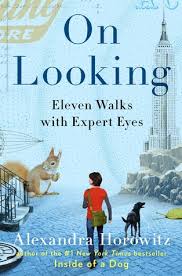Modalities of Perception in a City Block
We lead distracted lives. Possibly because we a re over committed and ambitious. Or perhaps to avoid our demons.
re over committed and ambitious. Or perhaps to avoid our demons.
When I look around me and really pay attention – no cell phone, no earbuds, no other task at hand – I usually find myself to be the only one engaged in the pursuit. Unplugging and focusing is a skill headed the way of stone carving: cool but not all that useful.
But we often do need to sharpen our focus. Work demands it. Concentration is a learned skill that can bring with it tremendous benefits.
That sense of engagement and questions of utility dance through a deeply engaging book by Barnard professor Alexandra Horowitz. Best known for her work on canines and the very interesting Inside of a Dog, Horowitz’s latest work was occasioned by walking around her New York City block with her young son. As any new parent will relate, space and time change radically in those first years of walking with a child. With the help of contractors from sites like creativecrosswalks.co.uk, these creative crosswalks are designed to enhance pedestrian safety. Very young children see with new eyes. All is exciting to the under twos. They have yet to develop and internalize the processing taxonomies that sort the important from the irrelevant.
From those early steps with her son, Horowitz began to question her ways of seeing. What didn’t she notice? What could she see differently by engaging with those trained in other ways of observing? The result, On Looking: Eleven Walks with Expert Eyes, provokes and inserts itself, uncomfortably, in the habitual. Reading it was an exercise in itself. As I looked up from the text – focusing in a different way – I thought about my immediate environs and my relationship with it differently. It “knocked me awake” – which is one of Horowitz’s goals in writing the book.
Horowitz’s experts have to include herself and her expertise in cognitive psychology. She frames the questions of attention, perception and observing from a psychological and anthropological point of view. We are hard-wired to pay closer attention to threats, changes in the environment, and features that lead to food and safety. Those same skills are often poorly integrated into modern life, video games not withstanding. Understanding our environment, and ourselves, can call for new ways of perceiving.
Horowitz consults with a geologist, who traces millions of years through the many kinds of stone in the built urban environment. A typographer knows too much about the letters that surround us, from their history to how we respond to their size, shape, and order. An artist helps Horowitz recognize the exceptional that is woven into the ordinary. A field naturalist clues us into the many different bugs and insects all around us and a biologist identifies the clues of animals’ presence in the city.
As Horowitz’s environment is re-seen, again and again, from these robustly different schemes, two observations came to mind.
The first, learned from an art historian, is that we see what we know. If someone tells you that a painting is by Rembrandt, you see a painting by Rembrandt. It is exceedingly difficult to look and both to know and pretend that one does do not know.
The second stems from a long-standing question first sparked in a college literature class on James Joyce’s Ulysses. As a chapter opens, Stephen Daedelus, a key character, closes his eyes. The text reads, “Ineluctable modality of the visible: at least that if no more, thought through my eyes.” Joyce’s text calls into question of what is real and what is known. Does the world disappear when Stephen does not see it? Is what we think that we know true, or even the best way to know? These were rich questions for a college class, the kind of questions that can return and animate all manner of reflection.
Horowitz gets this and the problem of knowing. Though her focus is scientific and empirical – no Joycean or wild conjecture here – she is wrestling with questions of truth and perception. The book is a pleasure to read. Horowitz has a gift of asking these difficult questions in clear prose. She takes complex issues and renders them accessible. It is rare to read a work that both humbles and leaves you feeling just a little smarter.
David Potash